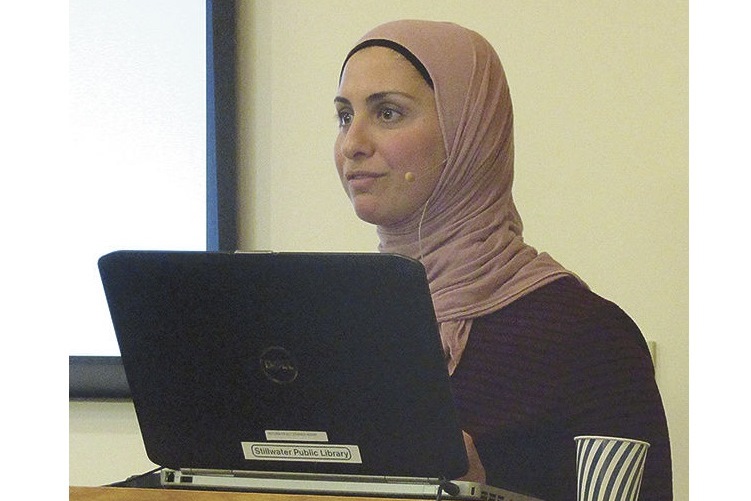Muslim Speaker Demystifies the Role of Women in Islam
The presentation, titled "Getting to Know the Role of Muslim Women Better,” was hosted by the St. Croix chapter of the American Association of University Women or AAUW (whose mission is to create equity for women and girls through advocacy, education, philanthropy and research) in partnership with the Stillwater Public Library. The event attracted a sizable audience, whose members were eager to learn about Islam and asked many questions throughout the evening presentation.
The guest speaker was Hanadi Chehabbedine from the Islamic Resource Group in Minneapolis. Originally from Lebanon, Chehabbedine is now an American citizen and resident of Eden Prairie, where she has been involved in local activism, reaching out to educate others about Islam.
The number one thing to understand, Chehabbedine said, is that religion and culture are two very different things. Not every culture that identifies as Islamic follows the Qur’an or the Hadith (the sayings of the Prophet) in quite the same way. As a Lebanese Muslim, Chehabbedine grew up with many more rights than her sisters in Saudi Arabia, where even non-Muslim women are forced to wear a veil or scarf, or Afghanistan, where many female children are denied education.
During her presentation at the Stillwater library, she dispelled many of the myths that Americans have about Islam, and especially the myth that Islamic women live in oppression. She shared passages from the Quran that highlight the role of women. Many people don’t realize, she said, that Muslim women keep their maiden names when they are married, and that education is a basic right for all children, male and female. Islam recognizes the right of women to own property (in fact, the first wife of the Prophet Muhammad (PBUH) was a businesswoman, and he was one of her employees). But Muslim women don’t have to work if they don’t want to — they are automatically assured financial security throughout their life.
The western world sometimes hears of forced marriages in Islam, but Chehabbedine said that consent is a requirement of marriage in Islam, and forced marriage is not an Islamic practice, but a cultural one.
Islam is especially reverent of mothers — in one story about the Prophet, a follower asks who among the people is most worthy of his companionship. When the Prophet says, "Your mother,” the man asks who is next. The Prophet repeats that his mother is most worthy two more times before finally saying "Your father.” Islam reveres many female figures, including Mary, mother of Jesus; Asiya, the wife of Pharaoh who rescued baby Moses; Khadijah, the first wife of the Prophet; and Fatima (SA), the daughter of the Prophet.
Susan Fletcher of the St. Croix AAUX was pleasantly surprised to have so many engaged audience members in attendance.
"I think people were looking for that kind of thing — being supportive of people who may face problems in the negativity we’ve been experiencing lately,” she said.
CShehabbedine reflected briefly on her experience presenting in Stillwater. It was her first time visiting the community, and she said she was also pleasantly surprised.
"It was one of the most pleasant presentations I did,” she said. "I have never been there, so I really didn’t know what to expect. It was good to see people come together and express how much in solidarity they are with the Muslim community.”
Source: presspubs.com




